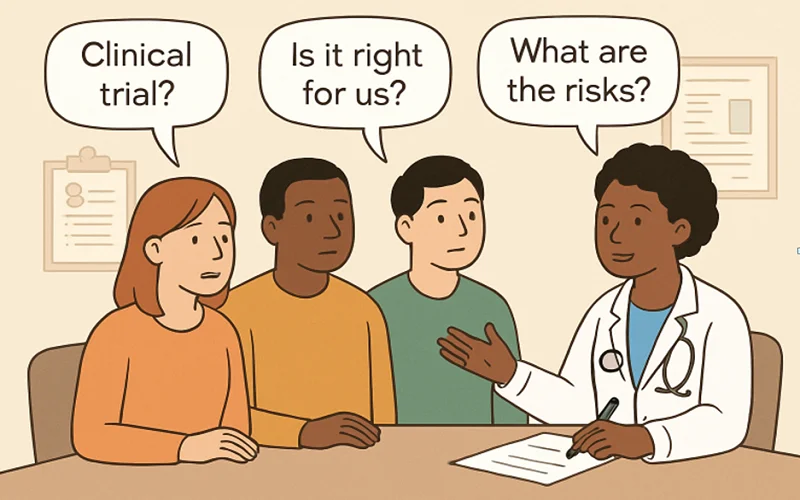Clinical trials are vital for healthcare, linking scientific discovery to treatment. Participants gain early access to new therapies, contribute to medical advances, and help develop better diagnosis and management methods. Their involvement supports progress, leading to safer, more effective therapies for future generations.
Clinical trials represent a crucial bridge between medical research and the advancement of new treatments. By participating, individuals gain access to promising therapies and help shape the future of healthcare. If you are considering taking part, you may wonder, are clinical trials safe? Understanding the process, risks, and benefits can help you make an informed decision.
Choosing to join a clinical trial is a personal decision that provides access to comprehensive care and the chance to contribute to breakthroughs. While it involves considerations, it also offers rewards for yourself and future patients.
Understanding Clinical Trials
Clinical trials are research studies conducted with human volunteers to assess the safety and effectiveness of new medications, medical devices, or approaches to disease management. These trials are fundamental to the development of fresh therapies and improvements in patient care.
Participating in a clinical trial can mean exposure to innovative treatments not yet available to the wider public. The information collected from these studies guides doctors, researchers, and regulatory agencies in determining whether these new options should become standard care.
Many people are motivated to join trials for the opportunity to potentially benefit from groundbreaking therapies and to support science in its quest for healthier futures. Modern safeguards ensure that each participant’s rights, safety, and well-being remain top priorities.
In addition to these benefits, it’s vital to examine whether a clinical trial is right for you, considering your current health needs and long-term treatment goals. Comprehensive discussions with healthcare professionals can guide you through this process.
Personal Benefits of Participation
Participating in a clinical trial can provide individuals with several key benefits. These include accessing novel therapies that may be more effective than existing standard treatments and are not yet widely available. Participants also receive comprehensive and close medical monitoring from a dedicated healthcare team focused on their progress and safety.
Furthermore, involvement in a trial allows individuals to take a more active role in managing their health, leading to a better understanding of their condition and treatment options. This participation often empowers individuals by expanding their choices and encouraging collaboration with expert medical professionals.
Contributing to Medical Research
While personal benefits are significant, participation in clinical research offers broader societal value. When individuals volunteer for trials, they actively help scientists develop new medicines and improve existing treatment methods. Every participant’s involvement paves the way for safer, more effective medical solutions for the public.
Recent advancements demonstrate how technology is shaping the future of clinical research. The application of deep learning and predictive modeling, as highlighted on arXiv, is helping to tailor clinical trials for better patient outcomes and to support the personalized medicine movement.
Potential Risks and Considerations
Clinical trial participation necessitates a thorough understanding of potential risks alongside anticipated benefits. Key considerations include the possibility of unexpected side effects or complications arising from investigational treatments, whose long-term impacts are still under examination.
Furthermore, trials often impose a significant time commitment, requiring frequent visits over an extended duration, which can be demanding for participants. It is also crucial to acknowledge that there is no certainty that the investigational therapy will be effective for every individual enrolled.
Therefore, a careful evaluation of these factors, coupled with guidance from trusted healthcare providers, is essential to ensure that a clear comprehension informs decisions regarding clinical trial involvement of the potential advantages and the inherent limitations.
Ensuring Safety and Ethical Standards
To safeguard participants, all clinical trials operate under strict ethical and legal obligations. Oversight is provided by Institutional Review Boards (IRBs), committees tasked with ensuring that studies minimize risk and follow rigorous ethical standards.
Part of this process is the informed consent procedure, where participants learn about all aspects of the study—including its purpose, procedures, risks, and potential benefits—so they can decide whether to join.
IRBs monitor trials continuously, and participant safety is always prioritized, even if that means altering or stopping the trial if significant concerns arise.
How to Find a Suitable Clinical Trial
Finding a clinical trial that matches your health condition and goals can seem challenging, but there are now more resources than ever to help. Here are a few steps to help you identify suitable studies:
- Consult Your Healthcare Provider: Start by discussing clinical trial options with your doctor, who may be aware of relevant opportunities and can help assess eligibility.
- Search Online Databases: Comprehensive listings are valuable for locating ongoing studies by location, disease, or intervention.
- Review Eligibility Criteria: Each trial has specific inclusion and exclusion requirements, so carefully check these before applying.
Technology is improving how patients and trials are matched. For example, advanced artificial intelligence tools are now being used to align study opportunities with suitable candidates better.
Conclusion
Participating in a clinical trial is an opportunity to receive potentially transformative treatments while advancing the future of medicine. With careful research, open discussions with healthcare providers, and a solid understanding of the process, you can make the best decision for your own health and well-being.
Clinical trials remain a cornerstone in the journey toward medical progress—and your involvement could make a life-changing difference for yourself and countless others.
